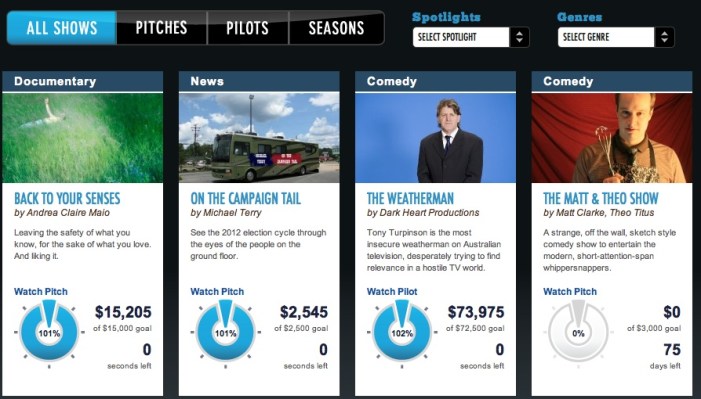It’s famously difficult to get a TV show on the air — much less one that still matches your initial vision. That’s why Mobcaster has launched a new platform where creators can ask fans for the financial support to produce their shows.
The startup just had its first funding success story — The Weatherman, an Australian-produced comedy about, yes, a weatherman, which has raised the funding needed for its first season. The production company set a goal of $72,500, and it raised $73,975. (As the team notes at the beginning of the pilot episode, traditional television episodes cost hundreds of thousands of dollars at the very least, so that’s a tiny budget for a full season.)
In many ways, Mobcaster is clearly modeled on Kickstarter. Members donate however much they want, they receive rewards for different donation levels (if you donated $100 to The Weatherman, you would receive a full Producer credit, for example), and you only pay if the project reaches the minimum donation level to get made. However, co-founder Aubrey Levy points out that Kickstarter doesn’t have many TV success stories, and whereas Mobcaster is designed specifically for the television model.
Creators first raise money for a pilot episode, usually by uploading a pitch and pilot script. Then, after they’ve shot the pilot, they can use it to fundraise for a six-episode season — which is shorter than most American TV seasons, but keeps the funding needed to a manageable level. (That’s also the length of a normal British TV season.) Shows can continue for as long as the creators want, raising money one season at a time.
Levy says Mobcaster provides another crucial piece of the puzzle — distribution. The vision is to turn the site into both a crowdfunding platform and an online video channel. Otherwise, creators raise money for a show but have no place to broadcast it, and are forced to “post and pray” for an audience. Levy argues that people don’t go to any of the existing video sites for an independent TV experience. On YouTube, they expect short-form amateur content (and music videos), and on the other end you have Hulu, where people want traditional TV shows.
Mobcaster will run ads with the videos and split the revenue 50-50 with the creators. And the creators own all the intellectual property, so if there’s interest, a show might actually make the transition to traditional TV (and Mobcaster gets a small cut of the payment).
Levy, by the way, was a digital media strategist at HBO, and he says he spent six or seven months pitching a TV show the old-fashioned way. Like most pitches, it never made it on-air, and thanks to network feedback, Levy says the show had actually got worse throughout the process. Not surprisingly, Mobcaster was built in response to those experiences — it gives the creators complete creative control, and it puts the show’s survival in the hands of the fans. (Think of all the fan campaigns to save canceled shows like Arrested Development and Firefly.)
“Ultimately the TV show is being made for you, so you’re the only person who should make the decision on whether the show should live or die,” he says.
